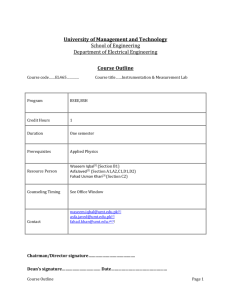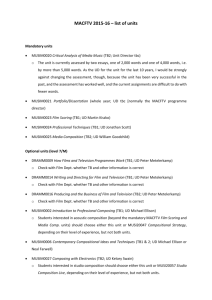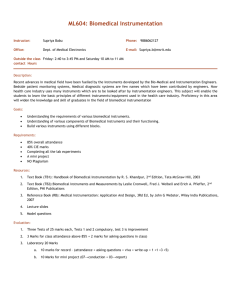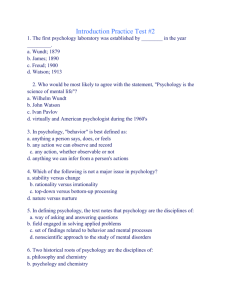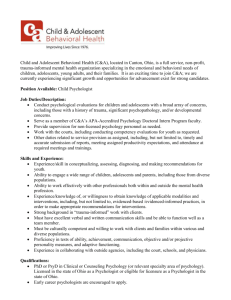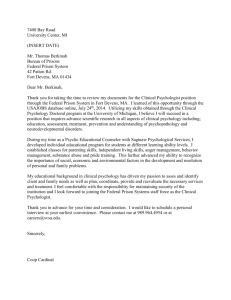Study Guide Mods 1-
advertisement
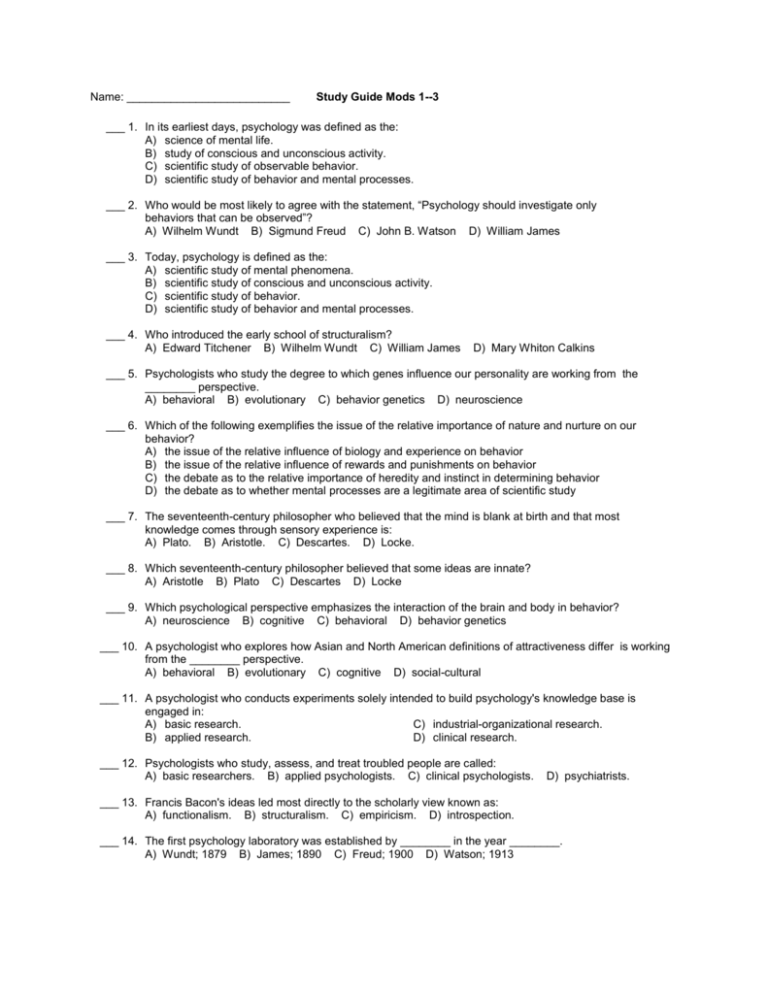
Name: __________________________ Study Guide Mods 1--3 ___ 1. In its earliest days, psychology was defined as the: A) science of mental life. B) study of conscious and unconscious activity. C) scientific study of observable behavior. D) scientific study of behavior and mental processes. ___ 2. Who would be most likely to agree with the statement, “Psychology should investigate only behaviors that can be observed”? A) Wilhelm Wundt B) Sigmund Freud C) John B. Watson D) William James ___ 3. Today, psychology is defined as the: A) scientific study of mental phenomena. B) scientific study of conscious and unconscious activity. C) scientific study of behavior. D) scientific study of behavior and mental processes. ___ 4. Who introduced the early school of structuralism? A) Edward Titchener B) Wilhelm Wundt C) William James D) Mary Whiton Calkins ___ 5. Psychologists who study the degree to which genes influence our personality are working from the ________ perspective. A) behavioral B) evolutionary C) behavior genetics D) neuroscience ___ 6. Which of the following exemplifies the issue of the relative importance of nature and nurture on our behavior? A) the issue of the relative influence of biology and experience on behavior B) the issue of the relative influence of rewards and punishments on behavior C) the debate as to the relative importance of heredity and instinct in determining behavior D) the debate as to whether mental processes are a legitimate area of scientific study ___ 7. The seventeenth-century philosopher who believed that the mind is blank at birth and that most knowledge comes through sensory experience is: A) Plato. B) Aristotle. C) Descartes. D) Locke. ___ 8. Which seventeenth-century philosopher believed that some ideas are innate? A) Aristotle B) Plato C) Descartes D) Locke ___ 9. Which psychological perspective emphasizes the interaction of the brain and body in behavior? A) neuroscience B) cognitive C) behavioral D) behavior genetics ___ 10. A psychologist who explores how Asian and North American definitions of attractiveness differ is working from the ________ perspective. A) behavioral B) evolutionary C) cognitive D) social-cultural ___ 11. A psychologist who conducts experiments solely intended to build psychology's knowledge base is engaged in: A) basic research. C) industrial-organizational research. B) applied research. D) clinical research. ___ 12. Psychologists who study, assess, and treat troubled people are called: A) basic researchers. B) applied psychologists. C) clinical psychologists. D) psychiatrists. ___ 13. Francis Bacon's ideas led most directly to the scholarly view known as: A) functionalism. B) structuralism. C) empiricism. D) introspection. ___ 14. The first psychology laboratory was established by ________ in the year ________. A) Wundt; 1879 B) James; 1890 C) Freud; 1900 D) Watson; 1913 ___ 15. In psychology, behavior is best defined as: A) anything a person says, does, or feels. B) any action we can observe and record. C) any action, whether observable or not. D) anything we can infer from a person's actions. ___ 16. Carl Rogers and Abraham Maslow are most closely associated with: A) cognitive psychology. C) psychodynamic theory. B) behaviorism. D) humanistic psychology. ___ 17. Two historical roots of psychology are the disciplines of: A) philosophy and chemistry. C) philosophy and biology. B) physiology and chemistry. D) philosophy and physics. ___ 18. The Greek philosopher who believed that intelligence was inherited was: A) Aristotle. B) Plato. C) Descartes. D) Simonides. ___ 19. The way the mind encodes, processes, stores, and retrieves information is the primary concern of the ________ perspective. A) neuroscience B) evolutionary C) social-cultural D) cognitive ___ 20. Dr. Jones' research centers on the relationship between changes in our thinking over the life span and changes in moral reasoning. Dr. Jones is most likely a: A) clinical psychologist. C) psychiatrist. B) personality psychologist. D) developmental psychologist. ___ 21. Which subfield is most directly concerned with studying human behavior in the workplace? A) clinical psychology C) industrial/organizational psychology B) personality psychology D) psychiatry ___ 22. Dr. Ernst explains behavior in terms of different situations. Dr. Ernst is working from the ________ perspective. A) behavioral B) evolutionary C) social-cultural D) cognitive ___ 23. Which perspective emphasizes the learning of observable responses? A) behavioral B) social-cultural C) neuroscience D) cognitive ___ 24. A psychologist who studies how worker productivity might be increased by changing office layout is engaged in ________ research. A) applied B) basic C) clinical D) developmental ___ 25. Terrence wants to talk to a professional to help him cope with some academic challenges he's facing. You recommend that he contact a(n): A) industrial/organizational psychologist. C) counseling psychologist. B) developmental psychologist. D) psychiatrist. ___ 26. Professor Gutierrez, who believes that human emotions are best understood as being jointly determined by heredity, learning, and the individual's social and cultural contexts, is evidently a proponent of the: A) psychodynamic perspective. C) evolutionary perspective. B) biopsychosocial approach. D) neuroscience perspective. ___ 27. The philosophical views of John Locke are to those of René Descartes as ________ is to ________. A) nature; nurture B) nurture; nature C) rationality; irrationality D) irrationality; rationality ___ 28. Dr. Waung investigates how a person's interpretation of a situation affects his or her reaction. Evidently, Dr. Waung is working from the ________ perspective. A) neuroscience B) behavioral C) cognitive D) social-cultural ___ 29. Dr. Aswad is studying people's enduring inner traits. Dr. Aswad is most likely a(n): A) clinical psychologist. C) personality psychologist. B) psychiatrist. D) industrial/organizational psychologist. ___ 30. During a dinner conversation, a friend says that the cognitive and behavioral perspectives are quite similar. You disagree and point out that the cognitive perspective emphasizes ________, whereas the behavioral perspective emphasizes ________. A) conscious processes; observable responses B) unconscious processes; conscious processes C) overt behaviors; covert behaviors D) introspection; experimentation ___ 31. The psychological views of William James are to those of Edward Titchener as ________ is to ________. A) nature; nurture C) structuralism; functionalism B) nurture; nature D) functionalism; structuralism ___ 32. Theories are defined as: A) testable propositions. B) factors that may change in response to manipulation. C) statistical indexes. D) principles that help to organize, predict, and explain facts. ___ 33. The scientific attitude of skepticism is based on the belief that: A) people are rarely candid in revealing their thoughts. B) mental processes can't be studied objectively. C) the scientist's intuition about behavior is usually correct. D) ideas need to be tested against observable evidence. ___ 34. Juwan eagerly opened an online trading account, believing that his market savvy would allow him to pick stocks that would make him a rich day trader. This belief best illustrates: A) a scientific attitude. B) critical thinking. C) hindsight bias. D) overconfidence. ___ 35. Which statement about the ethics of experimentation with people and animals is false? A) Only a small percentage of animal experiments use shock. B) Allegations that psychologists routinely subject animals to pain, starvation, and other inhumane conditions have been proven untrue. C) The American Psychological Association and the British Psychological Society have set strict guidelines for the care and treatment of human and animal subjects. D) Animals are used in psychological research more often than they are killed by humane animal shelters. ___ 36. Which of the following is true, according to the text? A) Because laboratory experiments are artificial, any principles discovered cannot be applied to everyday behaviors. B) No psychological theory can be considered a good one until it produces testable predictions. C) Psychology's theories reflect common sense. D) Psychology has few ties to other disciplines. ___ 37. You decide to test your belief that men drink more soft drinks than women by finding out whether more soft drinks are consumed per day in the men's dorm than in the women's dorm. Your belief is a(n)________, and your research prediction is a(n)________. A) hypothesis; theory C) operational definition; application B) theory; hypothesis D) application; operational definition ___ 38. Your best friend criticizes psychological research for being artificial and having no relevance to behavior in real life. In defense of psychology's use of laboratory experiments you point out that: A) psychologists make every attempt to avoid artificiality by setting up experiments that closely simulate real-world environments. B) psychologists who conduct basic research are not concerned with the applicability of their findings to the real world. C) most psychological research is not conducted in a laboratory environment. D) psychologists intentionally study behavior in simplified environments in order to gain greater control over variables and to test general principles that help to explain many behaviors. ___ 39. A friend majoring in anthropology is critical of psychological research because it often ignores the influence of culture on thoughts and actions. You point out that: A) there is very little evidence that cultural diversity has a significant effect on specific behaviors and attitudes. B) most researchers assign participants to experimental and control conditions in such a way as to fairly represent the cultural diversity of the population under study. C) it is impossible for psychologists to control for every possible variable that might influence research participants. D) even when specific thoughts and actions vary across cultures, as they often do, the underlying processes are much the same. ___ 40. After detailed study of a gunshot wound victim, a psychologist concludes that the brain region destroyed is likely to be important for memory functions. Which type of research did the psychologist use to deduce this? A) the case study B) a survey C) correlation D) experimentation ___ 41. A psychologist studies the play behavior of third-grade children by watching groups during recess at school. Which type of research is being used? A) correlation B) case study C) experimentation D) naturalistic observation ___ 42. Well-done surveys measure attitudes in a representative subset, or ________, of an entire group, or ________ . A) population; random sample C) experimental group; control group B) control group; experimental group D) random sample; population ___ 43. In generalizing from a sample to the population, it is important that: A) the sample is representative of the population. B) the sample is large. C) the scores in the sample have low variability. D) all of the above are observed. ___ 44. One reason researchers base their findings on representative samples is to avoid the false consensus effect, which refers to our tendency to: A) overestimate the extent to which others share our belief. B) falsely perceive a relationship between two events when none exists. C) be affected by a treatment simply because we believe in it. D) make all of the above reasoning errors. ___ 45. In generalizing from a sample to the population, it is important that: A) the sample be representative. C) the sample not be too large. B) the sample be nonrandom. D) all of the above be true. Answer Key 1. A science of mental life. Origin: TB1 Module 1- Study Guide, 1 Format: Multiple Choice 2. C John B. Watson Origin: TB1 Module 1- Study Guide, 2 Format: Multiple Choice 3. C D scientific study of behavior. Origin: TB1 Module 1- Study Guide, 3 Format: Multiple Choice 4. A Edward Titchener Origin: TB1 Module 1- Study Guide, 4 Format: Multiple Choice 5. C behavior genetics Origin: TB1 Module 1- Study Guide, 6 Format: Multiple Choice 6. A the issue of the relative influence of biology and experience on behavior Origin: TB1 Module 1- Study Guide, 7 Format: Multiple Choice 7. D Locke. Origin: TB1 Module 1- Study Guide, 8 Format: Multiple Choice 8. C Descartes Origin: TB1 Module 1- Study Guide, 9 Format: Multiple Choice 9. A neuroscience Origin: TB1 Module 1- Study Guide, 10 Format: Multiple Choice 10. D social-cultural Origin: TB1 Module 1- Study Guide, 11 Format: Multiple Choice 11. A basic research. Origin: TB1 Module 1- Study Guide, 12 Format: Multiple Choice 12. C clinical psychologists. Origin: TB1 Module 1- Study Guide, 13 Format: Multiple Choice 13. C empiricism. Origin: TB1 Module 1- Study Guide, 16 Format: Multiple Choice 14. A Wundt; 1879 Origin: TB1 Module 1- Study Guide, 17 Format: Multiple Choice 15. B any action we can observe and record. Origin: TB1 Module 1- Study Guide, 19 Format: Multiple Choice 16. D humanistic psychology. Origin: TB1 Module 1- Study Guide, 20 Format: Multiple Choice 17. C philosophy and biology. Origin: TB1 Module 1- Study Guide, 22 Format: Multiple Choice 18. B Plato. Origin: TB1 Module 1- Study Guide, 23 Format: Multiple Choice 19. D cognitive Origin: TB1 Module 1- Study Guide, 24 Format: Multiple Choice 20. D developmental psychologist. Origin: TB1 Module 1- Study Guide, 26 Format: Multiple Choice 21. C industrial/organizational psychology Origin: TB1 Module 1- Study Guide, 27 Format: Multiple Choice 22. C social-cultural Origin: TB1 Module 1- Study Guide, 28 Format: Multiple Choice 23. A behavioral Origin: TB1 Module 1- Study Guide, 29 Format: Multiple Choice 24. A applied Origin: TB1 Module 1- Study Guide, 30 Format: Multiple Choice 25. C counseling psychologist. Origin: TB1 Module 1- Study Guide, 36 Format: Multiple Choice 26. B biopsychosocial approach. Origin: TB1 Module 1- Study Guide, 37 Format: Multiple Choice 27. B nurture; nature Origin: TB1 Module 1- Study Guide, 38 Format: Multiple Choice 28. C cognitive Origin: TB1 Module 1- Study Guide, 41 Format: Multiple Choice 29. C personality psychologist. Origin: TB1 Module 1- Study Guide, 42 Format: Multiple Choice 30. A conscious processes; observable responses Origin: TB1 Module 1- Study Guide, 44 Format: Multiple Choice 31. D functionalism; structuralism Origin: TB1 Module 1- Study Guide, 48 Format: Multiple Choice 32. D principles that help to organize, predict, and explain facts. Origin: TB1 Module 2- Study Guide, 1 Format: Multiple Choice 33. D ideas need to be tested against observable evidence. Origin: TB1 Module 2- Study Guide, 3 Format: Multiple Choice 34. D overconfidence. Origin: TB1 Module 2- Study Guide, 5 Format: Multiple Choice 35. D Animals are used in psychological research more often than they are killed by humane animal shelters. Origin: TB1 Module 2- Study Guide, 6 Format: Multiple Choice 36. B No psychological theory can be considered a good one until it produces testable predictions. Origin: TB1 Module 2- Study Guide, 8 Format: Multiple Choice 37. B theory; hypothesis Origin: TB1 Module 2- Study Guide, 9 Format: Multiple Choice 38. D psychologists intentionally study behavior in simplified environments in order to gain greater control over variables and to test general principles that help to explain many behaviors. Origin: TB1 Module 2- Study Guide, 10 Format: Multiple Choice 39. D even when specific thoughts and actions vary across cultures, as they often do, the underlying processes are much the same. Origin: TB1 Module 2- Study Guide, 12 Format: Multiple Choice 40. A the case study Origin: TB1 Module 3- Study Guide, 1 Format: Multiple Choice 41. D naturalistic observation Origin: TB1 Module 3- Study Guide, 4 Format: Multiple Choice 42. D random sample; population Origin: TB1 Module 3- Study Guide, 7 Format: Multiple Choice 43. D all of the above are observed. Origin: TB1 Module 3- Study Guide, 11 Format: Multiple Choice 44. A overestimate the extent to which others share our belief. Origin: TB1 Module 3- Study Guide, 18 Format: Multiple Choice 45. A the sample be representative. Origin: TB1 Module 3- Study Guide, 21 Format: Multiple Choice
